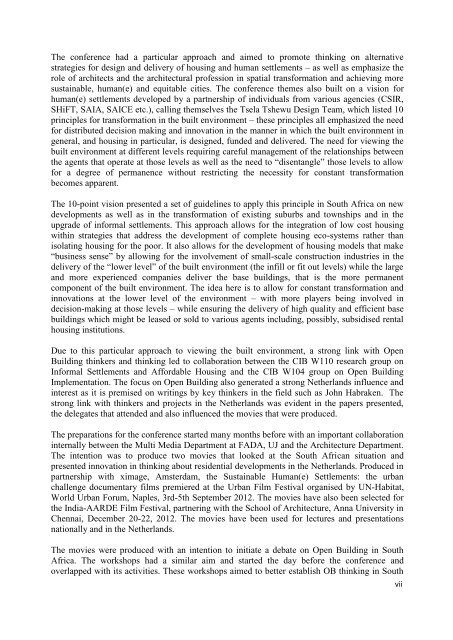ISBN: 978-0-620-54069-8 - Sustainable Human(e) Settlements: The ...
ISBN: 978-0-620-54069-8 - Sustainable Human(e) Settlements: The ...
ISBN: 978-0-620-54069-8 - Sustainable Human(e) Settlements: The ...
Create successful ePaper yourself
Turn your PDF publications into a flip-book with our unique Google optimized e-Paper software.
<strong>The</strong> conference had a particular approach and aimed to promote thinking on alternative<br />
strategies for design and delivery of housing and human settlements – as well as emphasize the<br />
role of architects and the architectural profession in spatial transformation and achieving more<br />
sustainable, human(e) and equitable cities. <strong>The</strong> conference themes also built on a vision for<br />
human(e) settlements developed by a partnership of individuals from various agencies (CSIR,<br />
SHiFT, SAIA, SAICE etc.), calling themselves the Tsela Tshewu Design Team, which listed 10<br />
principles for transformation in the built environment – these principles all emphasized the need<br />
for distributed decision making and innovation in the manner in which the built environment in<br />
general, and housing in particular, is designed, funded and delivered. <strong>The</strong> need for viewing the<br />
built environment at different levels requiring careful management of the relationships between<br />
the agents that operate at those levels as well as the need to “disentangle” those levels to allow<br />
for a degree of permanence without restricting the necessity for constant transformation<br />
becomes apparent.<br />
<strong>The</strong> 10-point vision presented a set of guidelines to apply this principle in South Africa on new<br />
developments as well as in the transformation of existing suburbs and townships and in the<br />
upgrade of informal settlements. This approach allows for the integration of low cost housing<br />
within strategies that address the development of complete housing eco-systems rather than<br />
isolating housing for the poor. It also allows for the development of housing models that make<br />
“business sense” by allowing for the involvement of small-scale construction industries in the<br />
delivery of the “lower level” of the built environment (the infill or fit out levels) while the large<br />
and more experienced companies deliver the base buildings, that is the more permanent<br />
component of the built environment. <strong>The</strong> idea here is to allow for constant transformation and<br />
innovations at the lower level of the environment – with more players being involved in<br />
decision-making at those levels – while ensuring the delivery of high quality and efficient base<br />
buildings which might be leased or sold to various agents including, possibly, subsidised rental<br />
housing institutions.<br />
Due to this particular approach to viewing the built environment, a strong link with Open<br />
Building thinkers and thinking led to collaboration between the CIB W110 research group on<br />
Informal <strong>Settlements</strong> and Affordable Housing and the CIB W104 group on Open Building<br />
Implementation. <strong>The</strong> focus on Open Building also generated a strong Netherlands influence and<br />
interest as it is premised on writings by key thinkers in the field such as John Habraken. <strong>The</strong><br />
strong link with thinkers and projects in the Netherlands was evident in the papers presented,<br />
the delegates that attended and also influenced the movies that were produced.<br />
<strong>The</strong> preparations for the conference started many months before with an important collaboration<br />
internally between the Multi Media Department at FADA, UJ and the Architecture Department.<br />
<strong>The</strong> intention was to produce two movies that looked at the South African situation and<br />
presented innovation in thinking about residential developments in the Netherlands. Produced in<br />
partnership with ximage, Amsterdam, the <strong>Sustainable</strong> <strong>Human</strong>(e) <strong>Settlements</strong>: the urban<br />
challenge documentary films premiered at the Urban Film Festival organised by UN-Habitat,<br />
World Urban Forum, Naples, 3rd-5th September 2012. <strong>The</strong> movies have also been selected for<br />
the India-AARDE Film Festival, partnering with the School of Architecture, Anna University in<br />
Chennai, December 20-22, 2012. <strong>The</strong> movies have been used for lectures and presentations<br />
nationally and in the Netherlands.<br />
<strong>The</strong> movies were produced with an intention to initiate a debate on Open Building in South<br />
Africa. <strong>The</strong> workshops had a similar aim and started the day before the conference and<br />
overlapped with its activities. <strong>The</strong>se workshops aimed to better establish OB thinking in South<br />
vii


